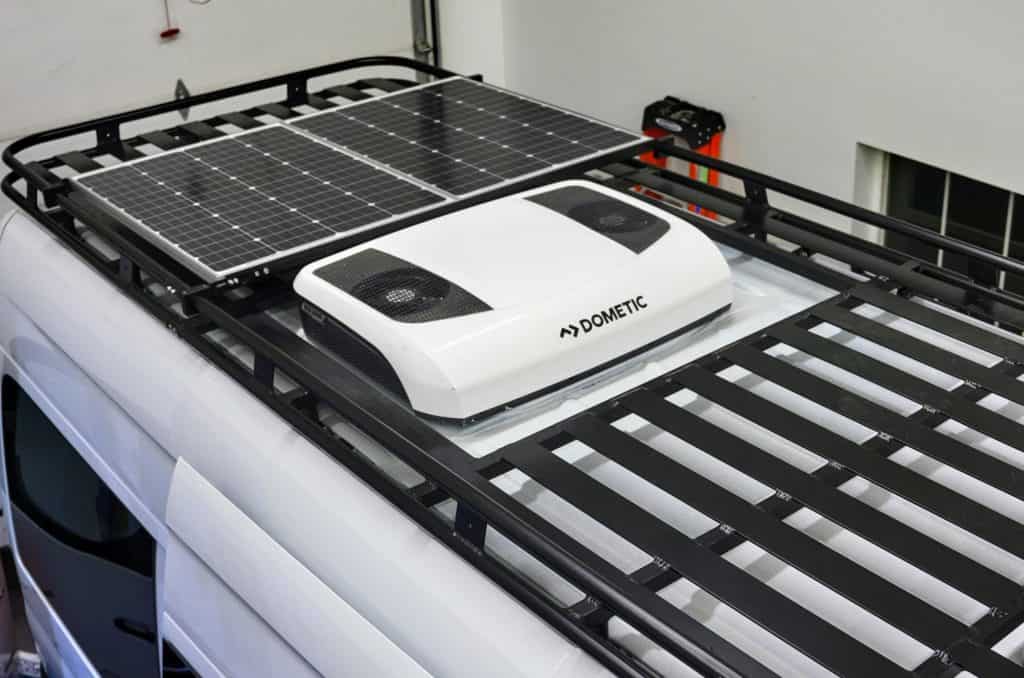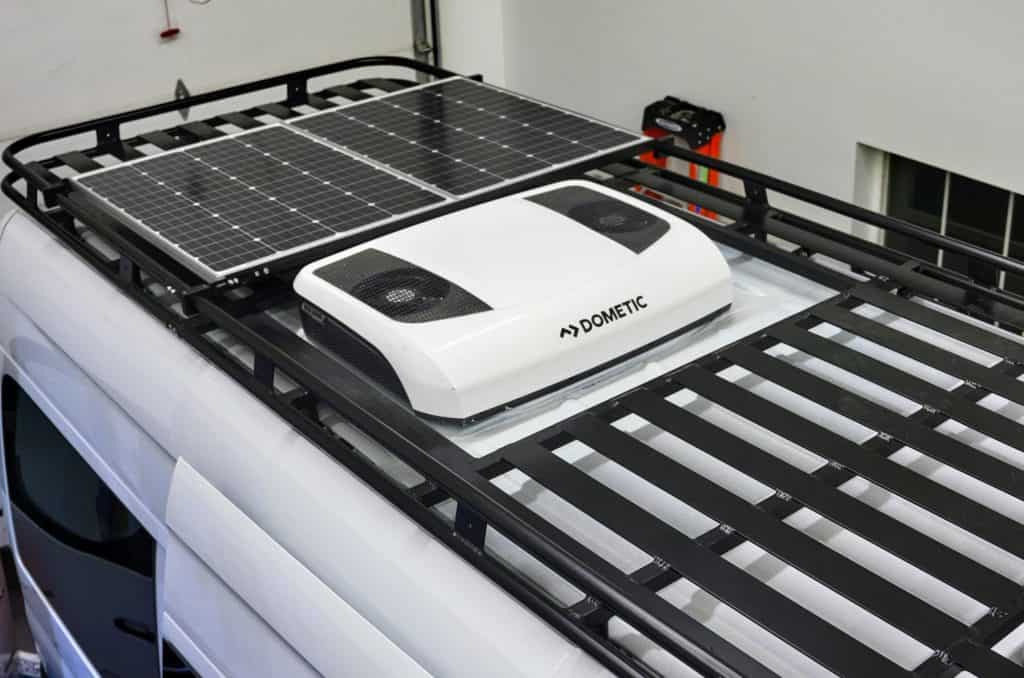Running an RV AC on battery alone is generally not feasible due to high power consumption. Batteries typically provide insufficient power for the prolonged operation of air conditioning units.
RV air conditioners require a substantial amount of power, which is far more than what standard RV batteries can deliver. Most RV air conditioning units are designed to run on 110V AC power, which means they need a connection to a mains supply or a generator capable of handling the high wattage demand.
While it is technically possible to use a battery bank coupled with an inverter, the setup would need to be large and would drain the batteries quickly, making it impractical for regular use. Therefore, for those planning to use AC while off-grid, investing in a suitable generator or exploring alternative cooling methods is advisable. This ensures comfort during your RV adventures without relying solely on battery power for air conditioning.
RV AC and Battery Basics
Imagine exploring the great outdoors in your RV. The sun is shining, the birds are chirping, and a cool breeze flows through your vehicle, thanks to the air conditioner. But what powers this oasis of comfort? Let’s dive into the essentials of RV AC and battery systems.
The Role Of AC in RV Comfort
During sweltering summer days, the air conditioner in your RV is not just a luxury; it’s a necessity. It keeps the interior cool and creates a comfortable environment. Without it, your RV can quickly turn into a sauna on wheels. But running an AC requires power, and that’s where your RV’s battery system comes in.
Understanding RV battery Capacities
Your RV battery is the heart of your vehicle’s electrical system. It stores energy to power various devices, including your air conditioner. But not all batteries are created equal. Knowing your battery’s capacity is crucial to ensure it can handle the AC’s demands.
Battery capacity is measured in amp-hours (Ah). This tells you how much electricity a battery can provide over a specific period. Here’s a simple breakdown:
- A 100 Ah battery can supply 100 amps for one hour.
- It can also deliver 5 amps for 20 hours.
- The higher the Ah, the more power at your disposal.
To run an RV AC on battery power, you’ll need a large battery bank or a high-capacity battery. But remember, AC units consume a lot of power. They often require more energy than what a single battery can provide for an extended period.
For an AC that draws about 15 amps, you’ll need a battery bank that can handle this draw for the duration of the AC’s use. A single 100 Ah battery may only run the AC for a short while before depleting.
Consider the following example:
| AC Amp Draw | Battery Capacity (Ah) | Estimated Runtime |
|---|---|---|
| 15 amps | 100 Ah | ~6.5 hours |
To calculate the actual runtime, use this formula:
Battery Capacity (Ah) / AC Amp Draw = Runtime (in hours)
So, can you run your RV AC on battery power? Yes, but you’ll need a robust battery system and a good understanding of how long it will last. Keep your adventures cool and comfortable by getting to know your RV’s battery capacities and AC requirements.
Challenges Of Running AC on Batteries
Challenges of Running AC on Batteries often discourage RV enthusiasts from enjoying the comfort of air conditioning off-grid. The energy demands of air conditioners are substantial, and battery technology has inherent limitations. Understanding these challenges can help in finding practical solutions for staying cool on the road.
Energy Requirements Of RV Air Conditioners
RV air conditioners are power-hungry appliances. They require a significant amount of electricity to function effectively. Here’s a breakdown of their energy consumption:
- Starting wattage: This is the initial power needed to start the AC unit. It’s considerably higher than the running wattage.
- Running wattage: Once the AC is on, the wattage drops but still demands a constant flow of energy to keep the unit running.
For example, a typical RV AC unit might need up to 3,500 watts to start and 1,500 watts to run. This power requirement poses a significant challenge for battery systems.
Limitations Of Battery Power
Battery power is limited by capacity, discharge rate, and recharge time. These factors directly impact the feasibility of running an AC unit on batteries:
| Battery Capacity | Discharge Rate | Recharge Time |
|---|---|---|
| Measured in amp-hours (Ah), indicating how much energy can be stored. | The speed at which energy can be delivered without damaging the battery. | The duration required to fully recharge the batteries after depletion. |
Battery capacity must be large enough to power an AC unit for several hours. Most RV batteries fall short of this requirement. The discharge rate must also be high enough to meet the initial surge of power. Standard RV batteries may not sustain this without suffering damage. Lastly, the recharge time can be lengthy, and without proper planning, you might be without AC for extended periods.
Types Of Batteries For RV Use
Choosing the right batteries for RV use is crucial. Your RV’s air conditioning can put quite the demand on your power supply. Understanding the types of batteries available can help ensure you stay cool on the road without hitches. Let’s explore the common battery options for powering an RV’s AC unit.
Lead-acid Batteries
Lead-acid batteries are a traditional choice for RV use. They come in two main types:
- Flooded: These need regular maintenance. They release gas during charging.
- Sealed: These are maintenance-free. They include AGM and Gel batteries.
Lead-acid batteries are less expensive but have a shorter lifespan and lower energy density compared to alternatives.
| Lead-Acid Battery Type | Maintenance Level | Lifespan |
|---|---|---|
| Flooded | High | Shorter |
| Sealed (AGM/Gel) | Low | Medium |
Lithium-ion Alternatives
Lithium-ion batteries are newer on the scene. They boast several benefits:
- Longer lifespan: They last longer than lead-acid batteries.
- Higher energy density: More power in less space.
- No maintenance: They don’t need water or regular check-ups.
While more costly upfront, lithium-ion batteries may save money in the long run. Their performance is more consistent, and they handle deep discharge better than lead-acid batteries.
| Feature | Lithium-Ion Advantage |
|---|---|
| Lifespan | Up to 10 years |
| Energy Density | High |
| Maintenance | None |
| Cost | Higher initial, lower overall |
Enhancing Battery Capacity For AC Use
Road adventures in an RV are thrilling but staying cool is essential. Running an AC on battery power raises questions. Can it handle the load? With the right setup, it’s possible. Let’s explore how to enhance your RV’s battery capacity for AC use.
Upgrading Your Rv Battery System
The first step is to assess your current battery system. Standard batteries might not suffice. Consider upgrading to a higher capacity. High-quality batteries like AGM or Lithium can sustain AC longer. They also charge faster and last longer.
- Choose a battery with a high amp-hour (Ah) rating.
- Ensure it’s a deep-cycle battery, designed for prolonged use.
- Look for durability and maintenance ease.
Battery Banks: Connecting Multiple Batteries
To power an AC unit, you might need more than one battery. Creating a battery bank is the solution. This involves connecting multiple batteries to increase capacity and voltage.
| Configuration | Advantage |
|---|---|
| Series Connection | Increases voltage to meet AC requirements |
| Parallel Connection | Increases capacity for longer usage |
Remember, consistency is key. Use identical batteries for balanced charging and discharging.
A well-planned battery system ensures your RV’s AC runs smoothly. Enjoy your travels in comfort, even off-grid.
Solar Power Integration
Solar Power Integration transforms how we use energy in RVs, especially for air conditioning. This system harnesses the sun’s power to run appliances efficiently and sustainably.
Harnessing Solar Energy For Ac
Running an RV AC on batteries integrated with solar power starts with the right setup. Solar panels collect sunlight, converting it into electrical energy. This energy charges the batteries that power the AC unit. It’s a clean and effective solution to keep cool without relying on external power sources.
Solar Panels And Charge Controllers
Solar panels and charge controllers are pivotal in this system. Here’s how they work together:
- Solar Panels: These panels capture sunlight. They convert it into electricity. The amount of power generated depends on the sunlight’s intensity and the panels’ efficiency.
- Charge Controllers: They manage the electricity flow from the panels to the batteries. This device ensures batteries charge properly and safely. It also protects batteries from overcharging.
A typical setup might look like this:
| Component | Function |
|---|---|
| Solar Panels | Capture and convert sunlight |
| Charge Controller | Regulates and directs power |
| Batteries | Store and provide energy |
| AC Unit | Uses energy to cool the RV |
To maximize efficiency, align solar panels where they receive maximum sunlight. Ensure the charge controller is compatible with your solar setup. Regular maintenance of all components extends their life and boosts performance.
With careful planning and the right equipment, solar power can effectively run RV AC systems, making your travel experiences greener and more sustainable.

Credit: battlebornbatteries.com
Power Inverters: Converting DC to Ac
Running your RV’s air conditioning on battery power is not as straightforward as it might seem. The key component to achieving this is a power inverter. This device converts the DC (Direct Current) stored in your batteries into AC (Alternating Current), which is what your RV’s air conditioner requires. Let’s delve into how to select the appropriate inverter and install it correctly.
Choosing The Right Inverter
Selecting the ideal inverter is critical. Consider the following points:
- Wattage: The inverter must handle the AC’s wattage.
- Pure Sine Wave: Ensures smooth operation of your AC.
- Efficiency: A higher efficiency rating saves battery power.
Match the inverter size with your AC unit. Check the AC’s wattage on its label and opt for an inverter with a 25-30% higher rating to account for power surges.
Installation Tips For Inverters
Proper installation is crucial. Here are some tips:
- Location: Install in a ventilated space to prevent overheating.
- Wiring: Use thick cables to minimize power loss.
- Safety: Install fuses or breakers for protection.
- Grounding: Ground the inverter to the RV’s chassis.
Always follow the manufacturer’s instructions. If unsure, consult a professional. This ensures your system runs efficiently and safely.
Managing Power Consumption Efficiently
When hitting the road in an RV, staying cool is key. But, managing power consumption efficiently can be a challenge. This section dives into how to run your RV AC on battery power without draining your resources.
Smart Usage Of Rv Ac
To keep the cool air flowing while managing energy, smart usage of your RV’s air conditioning is crucial. Consider these points:
- Run the AC during cooler times of the day.
- Use window shades to keep out the sun.
- Turn off the AC when not needed.
Energy Conservation Techniques
Energy conservation is essential for long trips. Apply these techniques:
- Insulate your RV to reduce heat exchange.
- Switch to LED lighting to save power.
- Regularly maintain your AC unit for efficiency.
By following these steps, you can enjoy a comfortable RV trip without worrying about power shortages.
Real-world Solutions And Alternatives
Exploring Real-World Solutions and Alternatives for running RV AC on battery power can seem challenging. Yet, practical solutions do exist. Let’s dive into some effective ways to keep your RV cool without traditional power sources.
Portable Battery Generators
Portable battery generators stand out as a top choice for powering RV air conditioners. These generators are not only powerful but also efficient and easy to use. They can run your AC unit for hours, depending on their capacity and your air conditioner’s power requirements. Here’s a quick look at their benefits:
- High Capacity: Stores enough power to run an RV AC.
- Portability: Easy to move and set up anywhere.
- Eco-Friendly: Often solar-compatible, reducing carbon footprint.
Before purchasing, check the generator’s specifications to ensure compatibility with your AC unit’s wattage and amperage requirements.
Alternative Cooling Methods
Beyond battery generators, several alternative methods can help keep your RV cool. These options are not only practical but also energy-efficient:
- Reflective Window Covers: Block sun heat from entering your RV.
- Vent Fans: Improve air circulation, reducing inside temperature.
- Portable Evaporative Coolers: Use less energy than traditional AC.
Implementing these methods can significantly enhance your comfort and reduce the need for constant AC use.
Professional Insights And User Experiences
Exploring the great outdoors in an RV brings comfort and adventure together. Yet, a common question arises: can an RV air conditioner run on batteries? This section delves into professional insights and user experiences, shedding light on this intriguing topic.
Expert Recommendations
RV air conditioners demand a lot of power, which batteries can struggle to provide. Professionals in the RV industry suggest specific setups for those who wish to cool their space without a generator or shore power.
- High-capacity batteries: A bank of deep-cycle batteries can store sufficient power.
- Inverters: A pure sine wave inverter converts DC power to AC.
- Solar panels: They can recharge batteries during the day.
Experts stress that a combination of these components is essential. They also emphasize regular maintenance to ensure efficiency.
Stories From RV Enthusiasts
Real-life stories from RV users offer valuable insights into running ACs on battery power. Here are some experiences:
| User | Setup | Experience |
|---|---|---|
| John and Jane | 400Ah Battery Bank, 3000W Inverter | AC ran smoothly for short periods. |
| The Smiths | 600Ah Lithium, Solar Panels | Daytime cooling was effective with solar help. |
| Emily | 200Ah AGM, No Solar | Struggled to keep AC running for long. |
These stories highlight the importance of a robust setup and realistic expectations when running an RV AC solely on battery power.
Maintenance Tips For Longevity
Keeping your RV’s AC system running smoothly requires regular maintenance. These tips will help ensure your AC and battery last longer. With proper care, you can enjoy cool, comfortable trips for years to come.
Regular Battery Care
Regular battery maintenance is crucial for your RV’s AC performance. Follow these steps:
- Check the charge frequently. Use a voltmeter.
- Clean terminals to prevent corrosion. Use a brush and baking soda.
- Keep it charged. Use a quality charger.
- Store properly during the offseason. Keep it cool and dry.
Ac Unit Servicing
AC unit servicing extends its life and efficiency. Stick to these guidelines:
| Service Task | Frequency |
|---|---|
| Clean or replace filters | Every 3 months |
| Inspect coils and fins | Annually |
| Check refrigerant levels | As needed |
| Examine electrical connections | Every 6 months |
Future Innovations In RV Power
The realm of recreational vehicles is on the cusp of a revolution, with future innovations in RV power taking center stage. As adventurers and digital nomads alike seek to extend their off-grid capabilities, the question of whether you can run an RV AC on battery power evolves with each technological advancement. Let’s explore the emerging technologies and the potential for improved battery life that could transform the RV lifestyle.
Emerging Technologies
On the horizon of RV power solutions, emerging technologies promise a new era of efficiency and sustainability. These breakthroughs aim to harness energy more effectively, allowing for longer periods of off-grid living without compromising on comfort.
- Solar-assisted systems capture renewable energy, reducing generator use.
- High-capacity lithium batteries store more power in a compact form.
- Smart energy management systems optimize power consumption, directing energy where and when it’s needed.
With these innovations, the idea of running an RV AC solely on battery power becomes more tangible.
Potential For Improved Battery Life
The future shines bright with the potential for improved battery life in RVs. Advancements in battery technology are key to longer, more reliable power sources for all on-board systems, including air conditioning.
| Technology | Benefits |
|---|---|
| Solid-state batteries | Higher energy density, faster charging |
| Graphene batteries | Improved capacity, durability |
| Modular battery systems | Customizable capacity, easy expansion |
These advancements could allow RV air conditioners to run longer on battery power alone, making them more practical for remote travel.

Credit: www.youtube.com
Conclusion
Running your RV AC on battery alone is indeed possible but requires careful planning and investment in the right equipment. Opting for a robust battery system and considering energy-efficient AC models will enhance your off-grid experience. Always prioritize safety and proper setup to enjoy cool comfort on your adventures.

